Monthly Mulling💡
Why We Remember What We Do: An Unexpected Key West Adventure and the Peak-End Rule
Hi👋 Tapan here.
Monthly Mulling is a 2x monthly newsletter with 3 timeless ideas to help you make better decisions in your life and career. Join now👇🏽
Note: If my emails end up in the ‘promotions’ tab, please move them to the inbox so you don’t miss out.
Happy Sunday y’all!
📖 Currently, I am reading: Life 3.0: Being Human in the Age of Artificial Intelligence by Max Tegmark
Max explains that Life 1.0 was simply biological, Life 2.0 was cultural, and Life 3.0 is technological. This book ponders various questions relating to Artificial Intelligence - How can we prosper through AI? Will AI take over the world and start controlling us? How can we make AI non-lethal? With AI being part of every conversation these days, I wanted to learn more and it has been a good buy (so far)!
🎢 A Tale From Key West: Memory and Experience
A few years ago, I was in Miami with my friends. We all had landed at separate times, said our hellos, checked into the AirBnb around 10 pm, and went straight to bed. Tired!
The next morning we had to wake up a bit early as we had to drive to Key West for a snorkelling excursion. It was a 4-hour drive and our snorkelling reservation was for 11 am! 🥱
We woke up the next morning, a bit later than planned, and took an Uber to the car rental for the pickup. Late!
When we reached the rental, there was an issue with our car reservation and they had to look for a replacement that could fit the 7 of us. By the time, the replacement car arrived, it was about 9:30 am. VERY LATE! 😰
There was no way we will be able to make it for the 11 am snorkelling reservation.
We called the snorkelling company and explained the situation. Luckily, they had another boat going out around 5 pm which had some open spaces. They would move our reservation, free of charge. Phew! 😮💨
We started the drive. Now, if you have never driven from Miami to Key West, it’s absolutely gorgeous. Single-lane road with turquoise water on both sides. Stunning.
We reached Key West around 3:30 pm, got lunch, had some Key Lime Pie (obviously), and reached the snorkelling rental. We geared up with our diving flippers and snorkels. Excited!
Unfortunately, the water was a bit turbulent in the evening. It was a bit difficult to swim and water constantly entered the tubes. No one could snorkel properly. We were supposed to go to three dive sites but after the second site, the instructor announced that we will have to cancel the expedition as it was unsafe. SAD! 😭
There was a bit of noise. Some people were angry. A lot of them asked if they can continue as they had already paid the full amount and were experienced swimmers. The instructor said, “The fees are non-refundable when it‘s about safety as stated on the booking receipt”.
The instructor continued, “BUT it’s time for sunset and we have champagne on the boat along with mixers. We are turning this boat into a sunset cruise party!” FREE MIMOSAS! 🥳
They turned up the music. We danced and drank our hearts out. Watched the beautiful sunset. The trip ended well.
A few days later I was back in the office. One of my colleagues asked me about the Key West trip. I said:
“It was amazing. We ended up snorkelling for a while… but the best bit was we got to see the sunset from the boat while sipping on free mimosas. So much FUN!”
💡Unmasking the Memory: Peak-End Rule in Action
So, what was the point of telling you this story?
After being late, almost not making it for the snorkelling trip, and not being able to actually snorkel… Why did I still remember this snorkelling trip as fun?! 🤔
Daniel Kahneman and Barbara Fredrickson found an answer to this question in 1993.
🧠 It’s called the Peak-end rule.
It states that people remember an experience based on how they felt at its peak and its end, not the average of every moment.
🏔️ Peak: The most intense or emotionally significant moment during the event.
🏁 End: The final moments or how the event concluded.
So, an experience that may have been dull for most of it, if it had a cracking bit in the middle and ended on a high will generally be remembered as more enjoyable than something that was decent all the way through but never reached those highs.
Turns out, our brains don't have the capacity to remember everything; instead, they have created a shortcut of recalling the peak and the end, making our minds act as if the rest never happened.
This creates a discrepancy between the real experience and the memory. It's as if we are two different people.
👁️ Experiencing self: This was us getting up late, feeling tired, not getting a car and waiting for the rental, being unable to snorkel due to turbulence, cancelling snorkelling, and finally, partying on a boat at sunset.
💬 Remembering self: This was when I was back at the office, I only recalled the snapshots, the best moments from the sunset boat party (peak and end).
We don’t choose between experiences, we choose between memories of experiences.
— Daniel Kahneman
🤔 Understanding the Impact of the Peak-End Rule
The peak-end rule has a strong influence on our memories, consequently our future decisions. So, here are four things to understand it better:
🦍 The peak-end rule comes from evolution: We can’t remember every moment we lived. So, evolutionarily, it made sense for us to only keep the memories that most aided our survival. Remembering the most painful and pleasurable moments helped us avoid them or seek them out in the future. For a caveman, recalling a berry that made him sick held more significance than a berry that was just average, like all the rest.
🫤 The peak-end rule can cause positive or negative memories: The peak could be a negative experience and we will remember that vividly, resulting in an entirely different recollection. My Key West story ended on a high note. But what if they had just cancelled snorkelling and sent us home without the party?
⏳ The duration doesn’t matter for the peak-end rule: A single, memorable peak or end can eclipse a long period of mediocrity.
Imagine you went for a one-week work assignment which included mundane presentations, meetings, and ungodly hours of work. On Thursday night, your team had a team dinner, next thing you know you end up at a speakeasy, and finally at a Karaoke! Chances are that you will remember the work trip as a fun assignment with the team even though you spent the majority of your trip doing dull things.
🧍🏼♂️The peak-end rule is subjective: Your friend may recall events differently from you. This is because the perception of the "peak" is experienced at an individual level and can vary among people.
Let's revisit my Key West story. I am quite certain that my friends will have a different recollection of this trip since we encountered distinct peaks and endings. One of my friends was genuinely thrilled about snorkelling and had been eagerly anticipating that adventure. On the other hand, my other friend, who desired to indulge in drinks, ended up being the designated driver for the evening!
💫 The Peak-End Rule in Everyday Life
Now that you know about the peak-end rule, let’s see where you could have seen this commonly in real life.
🏨 Hospitality Industry: Hotels and resorts usually have a smooth checkout experience. I was given a warm Stroopwafel when I was leaving my Amsterdam hotel. Spas provide a relaxing cooldown experience, sometimes with herbal tea. Restaurants sometimes provide a complimentary dessert. All of these create a positive last impression (end) even if your overall experience was average.
Instead, imagine experiencing this when you leave:
🎢 Theme Parks: They are masters at utilizing the peak-end rule. The rides are created such that they provide an intense emotional peak for visitors, even though you have to wait in long queues. In Disneyland, the day often ends with spectacular fireworks shows or parades, leaving visitors with a memorable and positive final experience!
👨🏼💻 User Experience: A lot of websites or applications are designed with the peak-end rule in mind. They reduce the negative peaks to provide a somewhat positive experience. Remember how Duolingo's mascot constantly encourages you to continue even if you fail? In games, when you clear a level you’re given rewards.
🛍️ Retail: The checkout experience is discussed at length to ensure the best “end” experience for a user. A lot of stores, such as Rituals, offer complimentary gifts or discounts when you’re about to check out. Retail stores such as IKEA (my article on how IKEA uses the Diderot Effect) have their restaurant and cafe at the end to enhance your shopping experience.
🎬 TV and Movies: Not talking about cliffhangers but a lot of movies and tv shows are designed to give that fulfilling, happy ending to the story. The directors create powerful peak moments, such as the hero jumping off a literal peak. But, the peak-end rule can work against them too. Game of Thrones was a great show, until the last season. People don’t remember the first seven seasons but just that it was a terrible show!
🔍 Using the Peak-End Rule in Your Life
All of this is great information but what do you do with this information? Let’s learn some use cases for the peak-end rule.
🏔️ Create strong peaks in memories: Break patterns and add unexpected touches. People remember how you made them feel, so strive for positive and memorable experiences.
Managers can boost team morale by celebrating milestones when significant work is completed successfully, fostering a sense of positivity and accomplishment in the project.
During a staycation, make memories by planning a lunch out or an evening walk by the river (stronger peak), rather than spending the day in a simple binge-fest at home (average day).
🏁 Finish on a high note: Focus on the final steps to create a positive impression in people's minds, whether it's a product, a meeting, or a vacation.
Professionals can leave a lasting impact by offering a token of appreciation. A simple "thank you" goes a long way.
For events, save the best and most enjoyable moments for the end, ensuring everyone leaves with warm and fuzzy feelings!
🧐 Focus on the details: Your product's performance may be flawless for 364 days, but a single failure (peak) can leave a lasting negative impression, influencing people's decisions. Pay attention to project and product details to avoid such negative peaks.
Remember, the duration of the peak-end or the average moment isn't significant. When planning a vacation, focus on creating high-intensity bursts of excitement, even if you don't have the entire trip planned.
In a tedious meeting, inserting a positive and entertaining slide during the presentation can make a difference. People will remember the slide that brought them joy.
Thanks for reading 🙏🏽 Do you think any of your friends or family will like Monthly Mulling like you? Please share!😇
If you have any comments, you can connect with me on Twitter or reply to this email!

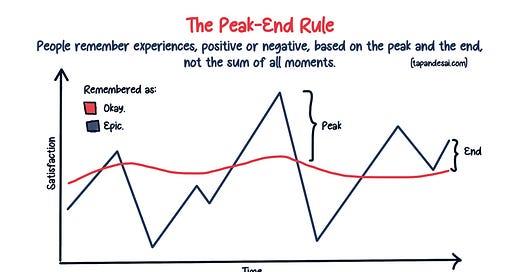

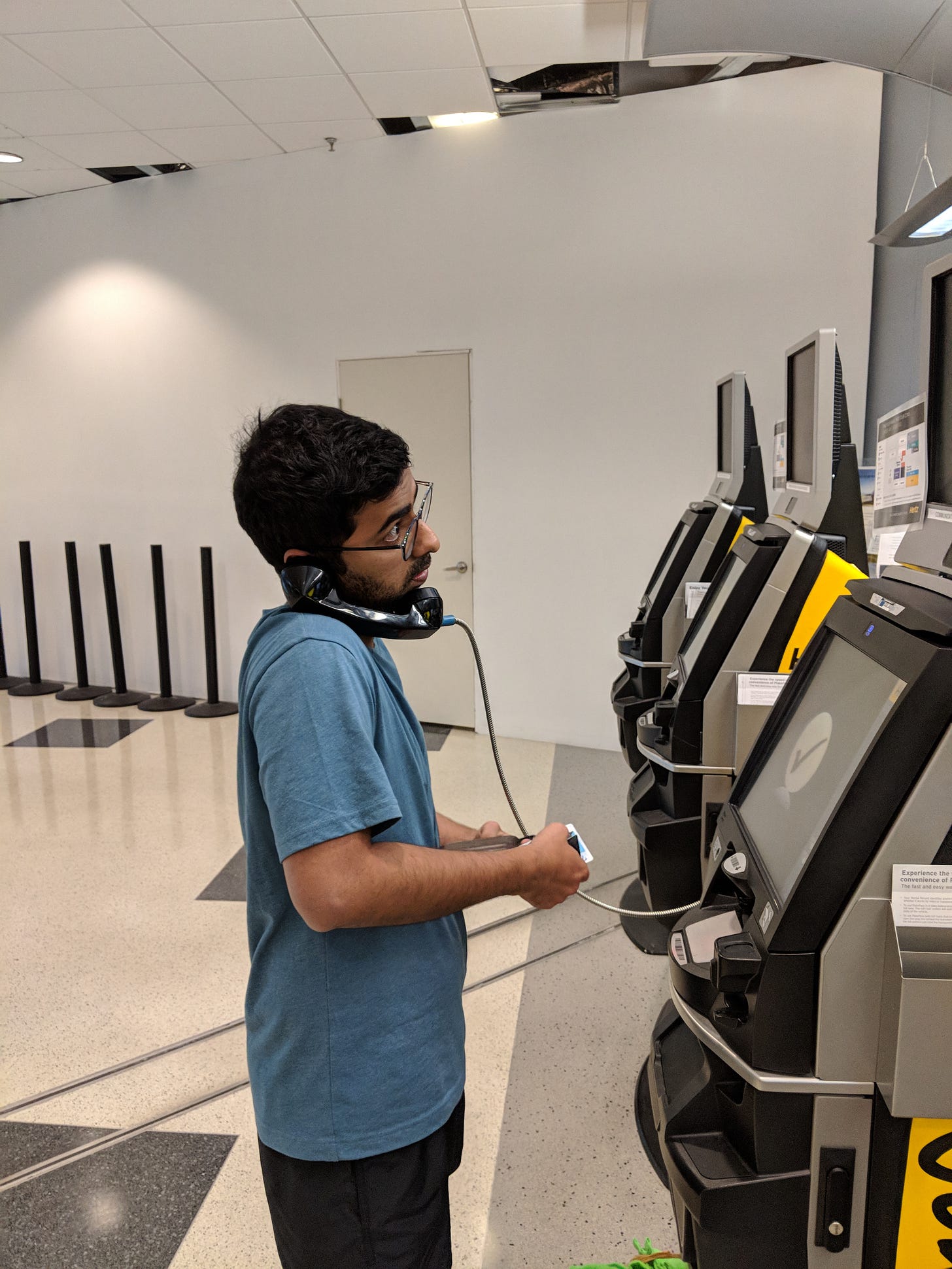
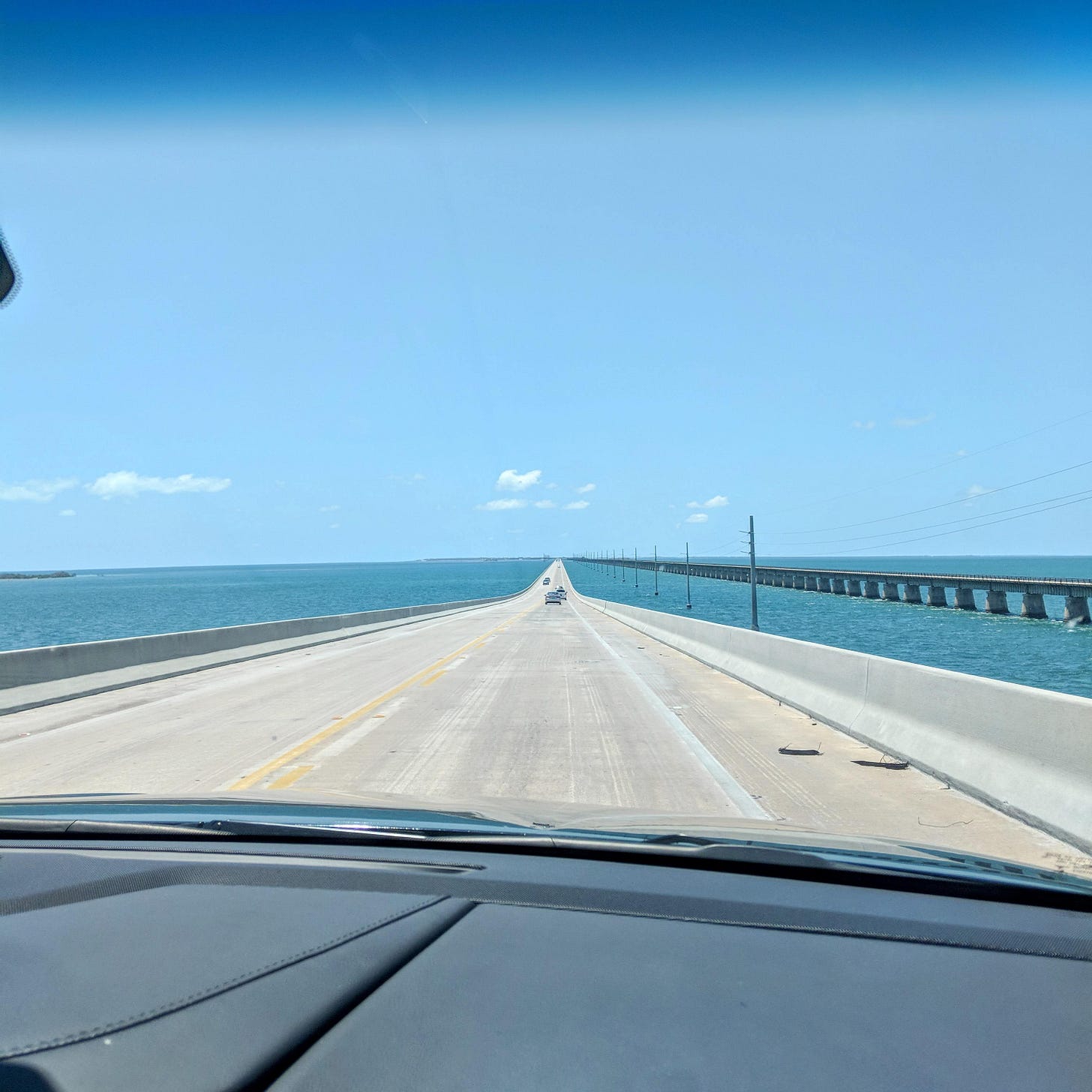
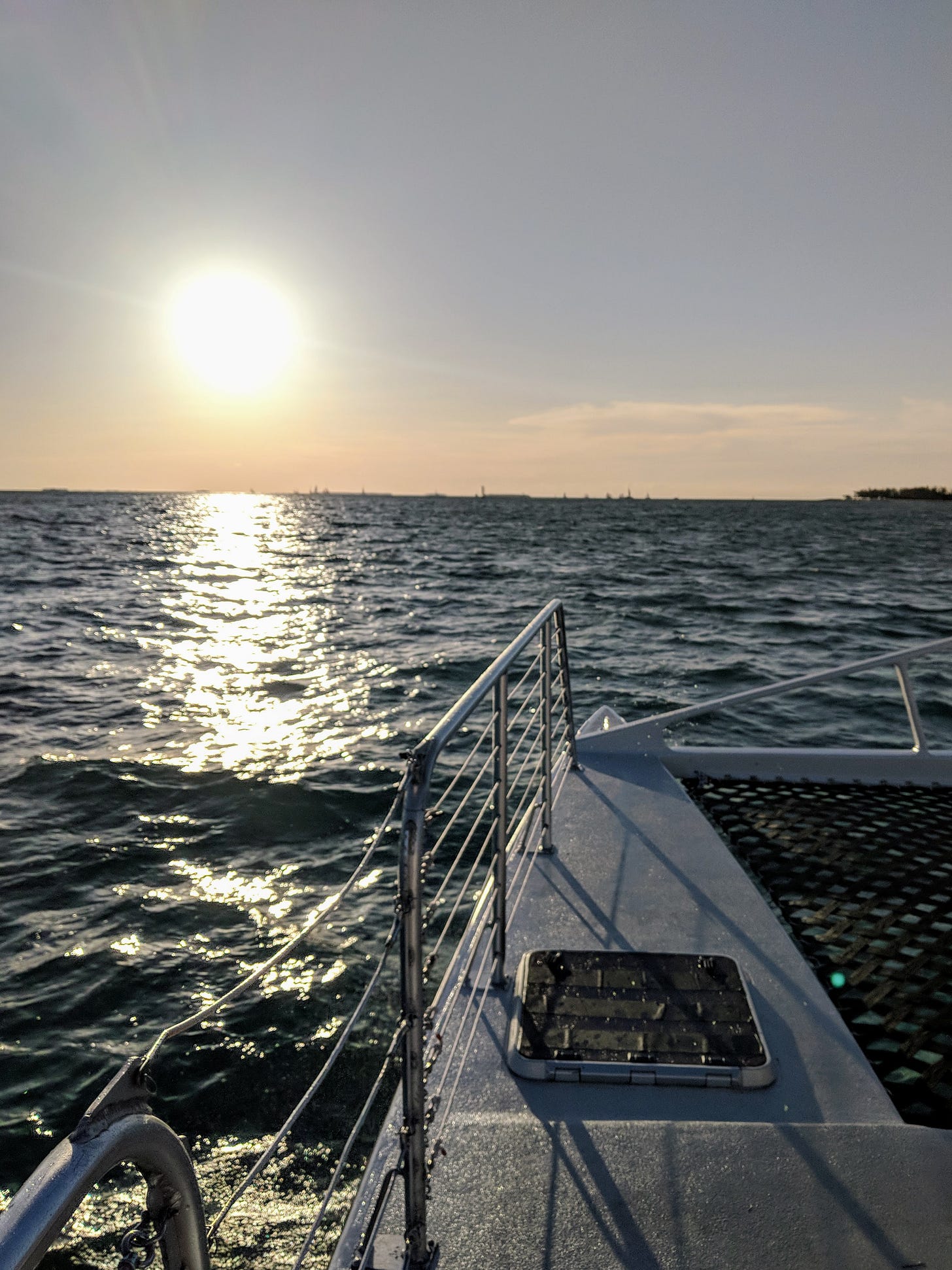


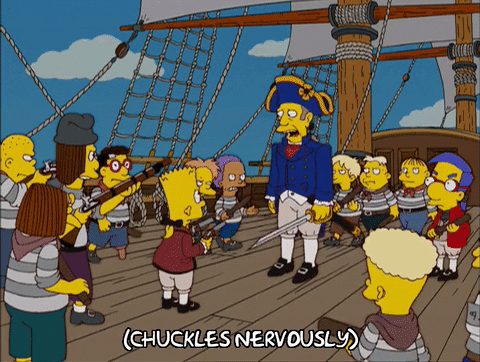


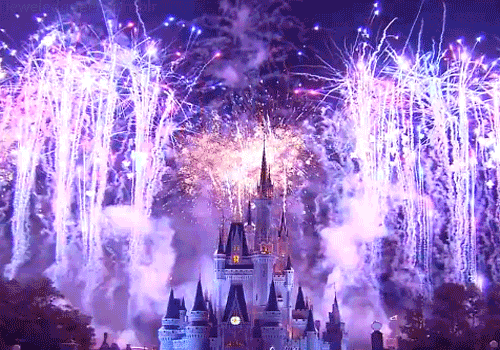
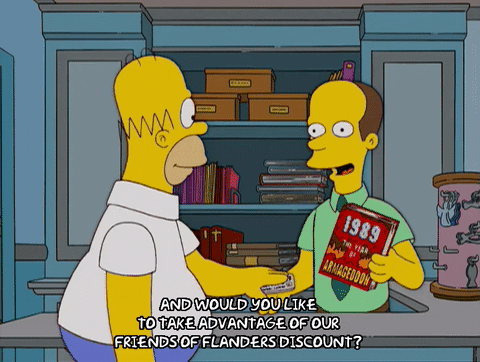
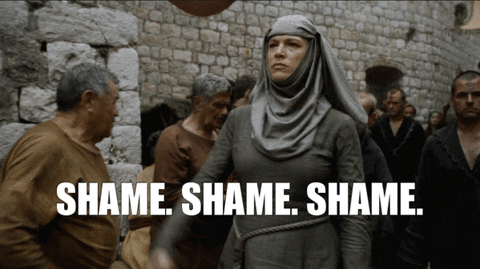

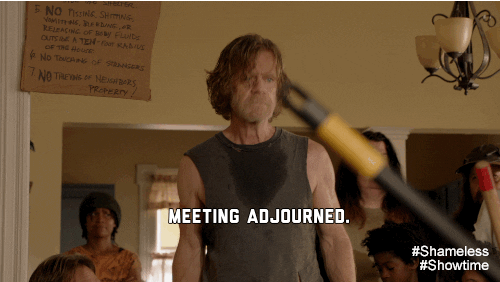
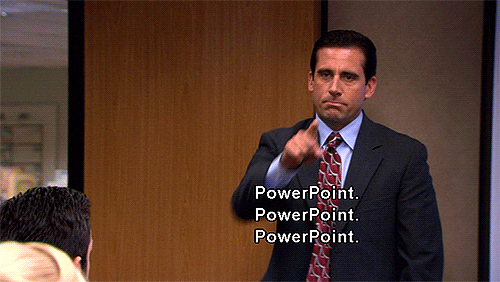
I really liked the part where you provided several examples of the Peak-End Rule in everyday life.
I was familiar with the concept from studying Daniel Kahneman's works, but your post added a new layer of understanding for me.
Now, I can consciously apply it in my life—ending on a high note and adding unique experiences along the way.
Thanks for sharing!
Great post! So nice to see how to tie this possibly difficult concept to understand with such an easy to follow example! Good that the boat had a Plan B on their sleeve (they had mimosa ingredients??!)
I'll add that Disney is a master in peak end experience! The songs they play on the very long path to the ticket entrance (for the parking spot and bus spot - probably more than 10 minutes walk) has really jolly, engaging, animated music. It really hypes you up!
Once the day ends are you're walking back to your car/bus, the songs in those "walking escalators" sound system invoke more of "nostalgia feelings", you're going "calmer" and happy you were there.